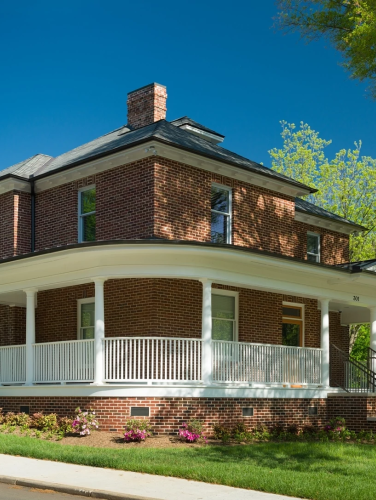
Dr. George E. Davis House
(ca. 1890s)
The home of Johnson C. Smith University’s first Black professor, the George E. Davis House stands as a testament to the legacy of one of North Carolina’s foremost advocates for Black education.
301 Campus St., Charlotte, NC 28216
The imposing house of Dr. George Edward Davis (1862-1959) at the corner of Campus and Dixon Streets in Charlotte’s Biddleville community echoes the profound influence he had on Johnson C. Smith University, Biddleville, and education for Black North Carolinians. Dr. Davis was the first Black professor at the school (then known as Biddle University), where he taught natural science and sociology for thirty-five years. As the school’s Dean of Faculty, he also played a major role in shaping JCSU’s educational mission for fifteen years. He built several houses near his own as rental housing, thereby molding the character of that neighborhood. Dr. Davis also served as a state agent for the Rosenwald Fund, an early twentieth century initiative jointly created by Tuskegee Institute president Booker T. Washington and Sears, Roebuck and Company president Julius Rosenwald that helped fund construction of nearly 5,400 schools for Black children across fifteen southern states.
Property Quick Links
A native of Wilmington, North Carolina, Davis graduated from Biddle in 1883, impressing the all-White faculty so much that he was offered a teaching post upon graduation. Intent upon pursuing a medical career, he instead enrolled in Howard University in Washington, but after two years of repeated requests from his alma mater, he returned to Biddle in 1885 to teach and ultimately earn his doctorate degree. In 1889, he purchased a one-acre lot at the corner of Campus (then Matoon) and Dixon Streets from University president Dr. Stephen Matoon for $100 to build the Victorian-style home with his wife Maria Gaston for their seven children. Over the years, the Davis family owned several nearby parcels on which they constructed rental properties for lease.
In 1920, after thirty-five years on the JCSU faculty, Dr. Davis began a new career working for the Division of Negro Education within the North Carolina Department of Public Instruction. As state supervisor for the Rosenwald buildings, his primary responsibility was to travel throughout the state to speak to local officials and Black groups to persuade them to match financial grants available from the Rosenwald Fund for the construction of new schools and the improvement of existing schools for young Black North Carolinians. Dr. Davis had a direct hand in raising more than a half-million dollars for many of the 813 Black schools built across North Carolina (the most in the nation) with partial financing from the Fund, including twenty-six Rosenwald schools in Mecklenburg County. In a 1921 letter describing his work for the state, Dr. Davis emphasized, “There is no investment of the state's funds today yielding better returns than the money spent in building good schools, paying for competent teachers and building good roads to get to them.”
Dr. Davis retired in 1935 at the age of seventy-three. In 1955, after moving to Greensboro to live with one of his daughters, he sold the Campus Street house to the University. The Davis House was used for many years as student housing before being repurposed for administrative uses by the University.

